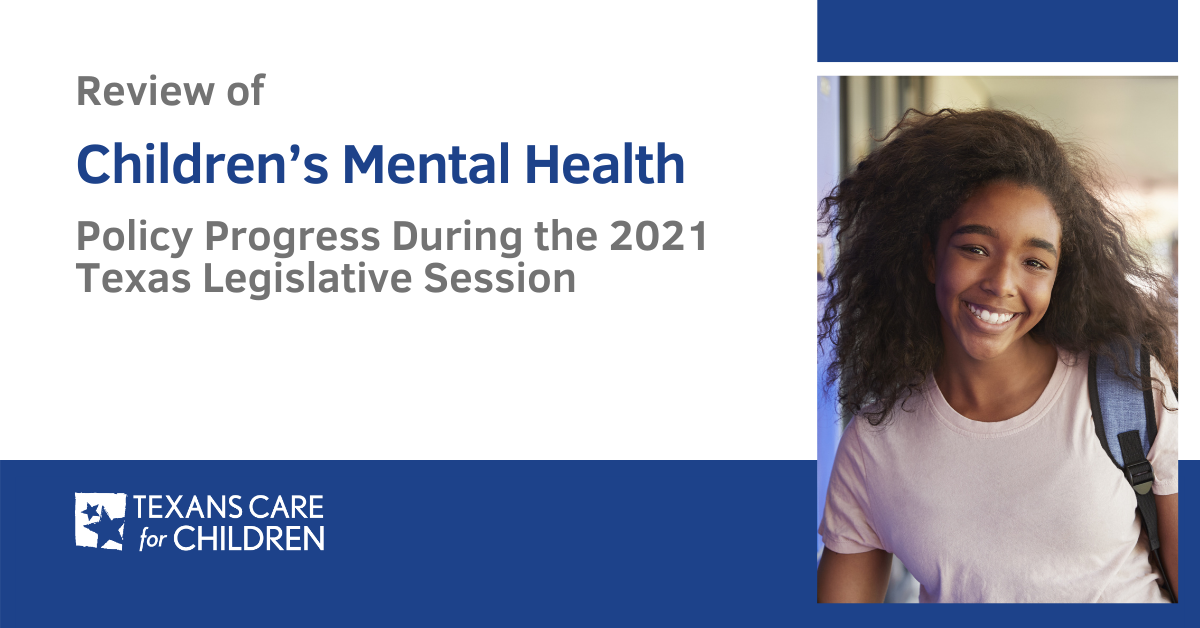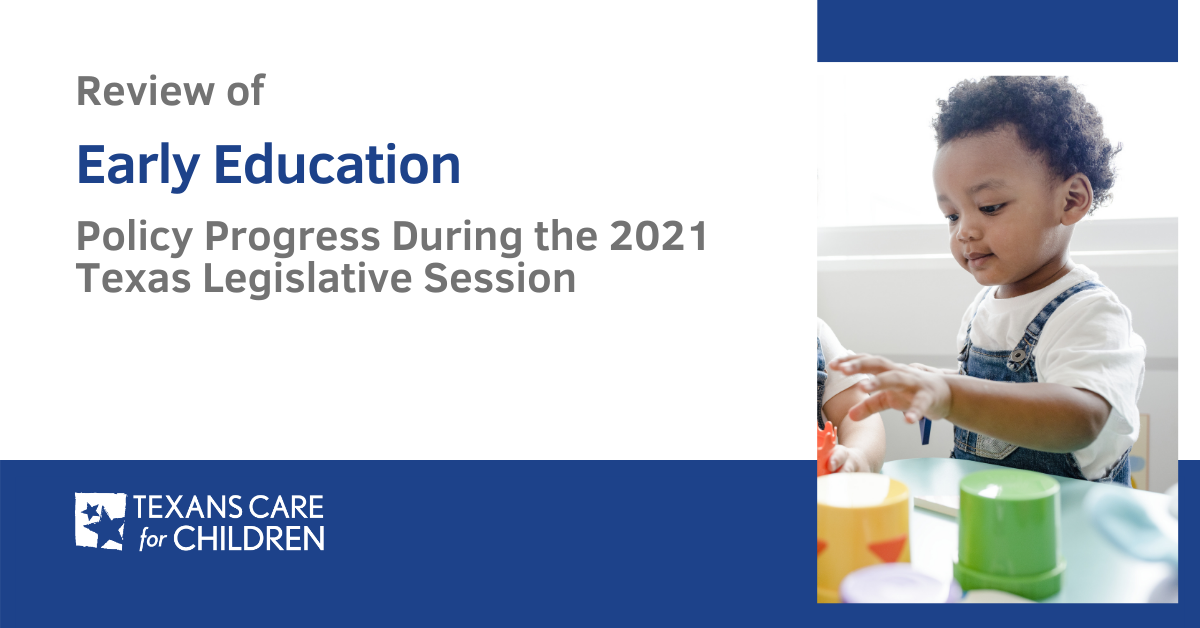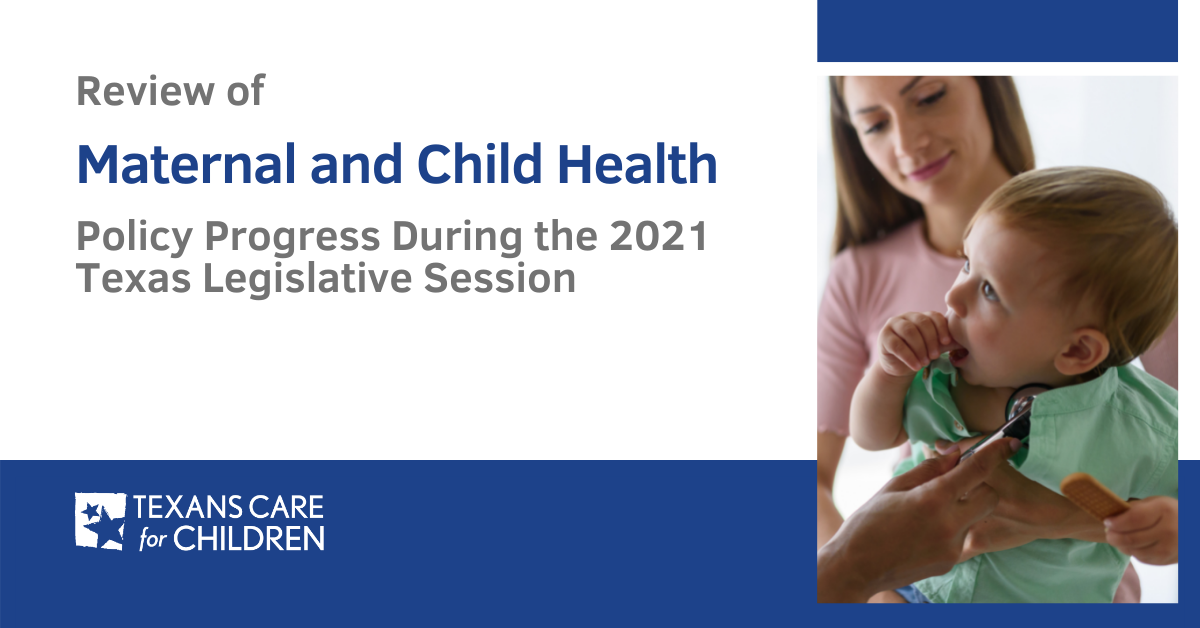During the 2021 legislative session, lawmakers passed bills to make significant improvements to the child protection system, but there is much more work to do. Our team and our partners from the Child Protection Roundtable worked closely with legislators to pass bills that will help more children move more quickly from group facilities to loving families, develop more foster homes equipped to serve pregnant and parenting youth, support older youth in foster care, and leverage the federal Family First Prevention Services Act (FFPSA) to keep more children safe with their families and out of foster care. We appreciate the work by Senator Lois Kolkhorst, Rep. James Frank, Rep. Jarvis Johnson, and others on these bills. We are also pleased to see that several proposals that we opposed did not pass. We are disappointed that the Legislature failed to increase funding for Prevention and Early Intervention (PEI) at DFPS and neglected to increase reimbursement rates to ease the shortage of safe and effective foster care homes and services. And we are concerned that the Legislature may be pinning too much hope on Community-Based Care, especially in light of inadequate funding for providers. There are significant challenges ahead for the Texas child protection system. Nonetheless, we’re cautiously optimistic that Texas is largely pointed in the right direction: working to keep children safe with their families and out of foster care when possible and working to ensure that kids who do enter foster care can heal and thrive.
Our team worked with legislators to successfully pass several important bills this session. For example, SB 1575 by Sen. Kolkhorst and Rep. Tom Oliverson will boost judicial oversight to ensure that kids with significant behavior challenges staying in foster care group facilities designated as “Qualified Residential Treatment Programs” (QRTPs) will be transferred to homes with families as soon as possible. The move is a key step for helping children and for complying with the FFPSA. The bill also directs the Children’s Commission to conduct a study that could expand these best practices to children in Residential Treatment Centers. Additionally, thanks to a funding boost via Rider 48 in the state budget, Texas will have an opportunity through a DFPS pilot to develop more QRTPs to serve children in foster care with the most significant behavioral health challenges. QRTPs are facilities certified as meeting certain best practices outlined in the FFPSA — such as trauma-informed care, family engagement, and aftercare services — that will help each child successfully transition from an institutional setting and remain stable with a family in the community.
The Legislature also passed SB 1896 by Sen. Kolkhorst and Rep. Frank, an omnibus bill to improve the safety and quality of the foster care system. The bill includes two priorities championed by our staff. The first directs DFPS to develop foster care homes prepared to serve unique populations in foster care, including pregnant and parenting youth, trafficking survivors, young adults, and others. (Similarly, Rider 29 in the state budget directs DFPS to report on the availability of these placements.) Our second priority included in the bill addresses Treatment Foster Care, a proven model where a professional foster family receiving additional training and support takes care of a child with significant behavioral health challenges in a home instead of an institution. At the beginning of session, DFPS expanded Treatment Foster Care to include children over age 10. SB 1896 codified that change and added flexibility so the model can serve even more children.
Additionally, lawmakers passed other important bills to support older youth in foster care, working closely with our team and coalition partners. For example, HB 700 by Rep. Jarvis Johnson and Sen. Judith Zaffirini helps youth take advantage of their college tuition waiver, allows 17-year-olds to administer — and therefore better understand — their own medication when it’s safe, updates Preparation for Adult Living (PAL) classes and curriculum, helps youth establish a rental history, improves transition planning by starting sooner and strengthening communication with youth, removes barriers that prevent youth from staying in extended care, and prevents youth with significant behavioral health challenges from aging out of a Residential Treatment Center when they turn 18 so they are not forced to fend for themselves. Rep. Johnson also passed HB 1315 with Sen. Beverly Powell to ensure continuous legal representation for youth in foster care and HB 80 with Sen. John Whitmire to help youth in foster care stay out of the adult justice system by eliminating fines as a punishment for minor mistakes. Many youth are often unable to pay those fines, resulting in arrest when a youth turns 17.
The Legislature also approved HB 567 by Rep. Frank and Sen. Bryan Hughes, making it harder for the courts to remove children from their families. We support keeping more children with their families and appreciate that the authors and stakeholders worked to incorporate our input into the legislation. However, to ensure that children are not endangered, it will be important to monitor how CPS interprets and implements the bill’s provision changing the definition of child neglect from exposure to “substantial risk” to exposure to “immediate danger.”
While legislators took steps to improve foster care and make it harder to remove children from their families, the Legislature did little — with one notable exception — to strengthen support for families when children are at risk of removal by CPS. For example, we are disappointed the Legislature turned down DFPS’ request for additional funding for PEI services that prevent abuse and neglect. The main exception to this trend was HB 3041 by Rep. Frank and Sen. Kolkhorst. Leveraging the federal FFPSA, the Legislature passed this important bill to establish two pilot programs to work with families that are already involved with CPS, aiming to keep kids safe with their families and out of foster care. After CPS investigates a case and determines that it needs court intervention, children may become eligible for these pilots. Courts will decide whether to connect families with prevention services while a child stays with their biological parents instead of removing the child. It will be important to monitor these pilots to see whether certain families are inadvertently excluded from receiving prevention services as an alternative to removal due to the bill’s narrow definition of “foster care candidacy.” Rider 48 in the state budget provides funding to implement HB 3041 and other FFPSA efforts.
We are also concerned that the Legislature may be pinning too much hope on Community-Based Care (CBC) as the answer to all the system’s problems when the evidence on outcomes for children is mixed at best. Under CBC, a local organization, rather than state officials, takes the lead on foster care in a particular region. We expect CBC contractors to continue to struggle to meet children’s needs, especially in light of the Legislature’s failure to increase reimbursement rates for foster care providers.
While the legislative session was noteworthy for all the legislation that passed regarding the child protection system, we were glad to see that some harmful bills did not pass, such as proposals to eliminate anonymous reporting to CPS, criminalize traumatized youth who are resistant to their foster care placements, and separate transgender youth from loving parents, potentially driving them into foster care.
Unfortunately, some good child protection bills failed to pass as well, including two that were approved by the House but never referred to a Senate committee: HB 2333 by Rep. Donna Howard to scale up evidence-based, voluntary nurse home visits for caregivers with newborns, such as visits conducted through Family Connects, and HB 1237 by Rep. James White to reduce racial disproportionality and disparities in the CPS system. These bills would have helped Texas safely reduce the number of children entering foster care.
The main child protection disappointment of the session was the Legislature’s failure to increase funding for reimbursement rates for foster care providers. The foster care system relies on nonprofits and other providers to operate homes for children with complex needs, recruit foster parents, offer mental health treatment, and deliver other services. One of the big reasons there is a shortage of safe and effective homes and services is the inadequate payments offered to these providers. To avoid exacerbating the current shortage and undermining good bills that passed this session, we urge the Governor and Legislature to address reimbursement rates in a special legislative session.





